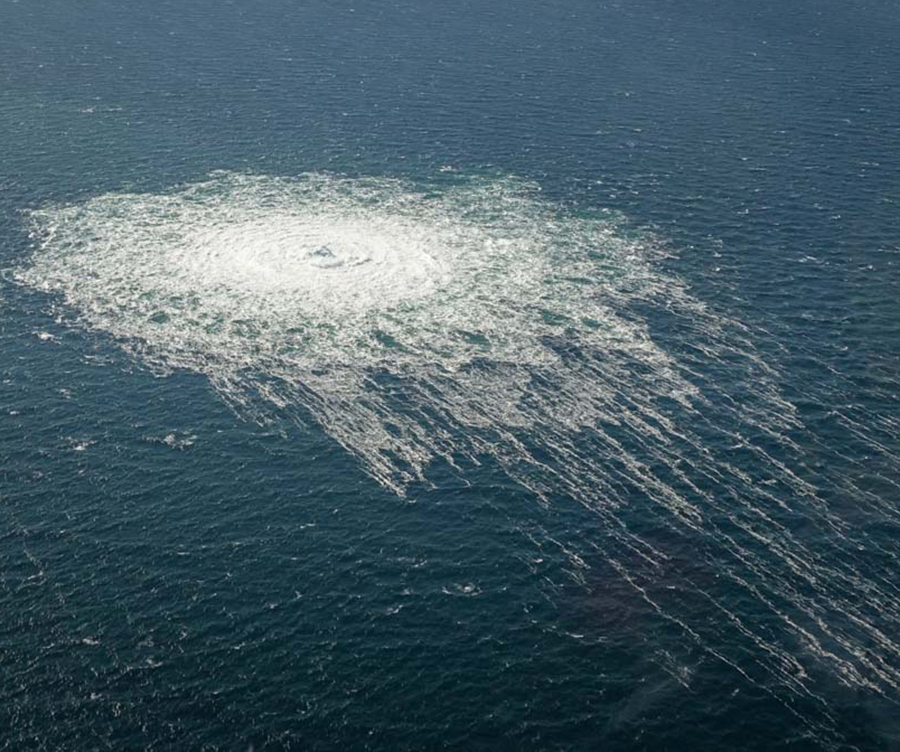Authorities in Europe are racing to bolster the continent’s energy infrastructure after unexplained damage to two Nord Stream gas pipelines between Russia and Germany.
Pipeline operator Nord Stream AG announced on September 27 it had detected a “significant pressure drop” following gas leaks, likely indicative of “pipeline physical damage”.
Danish military authorities confirmed the same day that a total of three gas leaks had occurred in the Baltic Sea, affecting Nord Stream 1 and 2, and published images showing an area of gas bubbles covering more than 1km of the water’s surface.
Seismologists in Sweden and Germany say the damage was caused by individual blasts rather than natural activity such as earthquakes, prompting speculation of sabotage by Russia – claims the Kremlin has dismissed as “absurd” – and vows from European officials to secure energy infrastructure elsewhere.
“All available information indicates those leaks are the result of a deliberate act,” the Council of the European Union says in a statement issued on September 28.
“We will support any investigation aimed at getting full clarity on what happened and why, and will take further steps to increase our resilience in energy security. Any deliberate disruption of European energy infrastructure is utterly unacceptable and will be met with a robust and united response.”
There are growing concerns that if the leaks were caused deliberately by Russian actors, similar attacks could be launched elsewhere. Norway’s government says it is increasing attention to safety across its operations, reiterating that the Nord Stream leaks appear to be “acts of sabotage”.
The country’s energy minister Terje Aasland said on September 27 that precautionary measures were being heightened across onshore and offshore infrastructure on the oil and gas-rich Norwegian continental shelf.
Danish defence minister Morten Bodskov added in a separate statement that Russia “has a significant military presence in the Baltic Sea region and we expect them to continue their sabre-rattling”.
Nord Stream 2 has long been a source of tension between the US and Russian governments. US opposition to the project grew steadily between 2018 and 2020, culminating in widespread sanctions against companies involved in completing its construction.
Europe seeks new gas markets
Neither of the damaged pipelines was transporting gas to Europe at the time of the leaks. Russian state-owned Gazprom announced early in September it was closing Nord Stream 1 indefinitely for maintenance reasons, while the completion of Nord Stream 2 was blocked by German officials following Russia’s invasion of Ukraine in February.
Data from think tank Bruegel shows that Russian gas is still reaching Europe via transit arrangements through Ukraine and through the Turkstream pipeline.
However, efforts in Europe to reduce reliance on imported Russian gas appear to be driving a spike in imports from the US – sparking concerns from sustainability campaigners about the environmental impact of expanding drilling capacity and other infrastructure.
Texas-headquartered LNG exporter Cheniere increased its earnings by US$3.8bn year-on-year in the first six months of 2022, largely due to a quadrupling of returns from short-term sales, Global Witness says in a research paper published last week.
Arizona-based Freeport’s revenue from exports to Europe tripled in the five months after Russia’s invasion, while California-headquartered Sempra benefited from an eight-fold increase in revenue from LNG sales, the paper adds.
Cheniere says in response to the report that it has “played a vital role in Europe’s energy security during this critical and tragic time”.
But Global Witness says the increase in US exporters’ LNG sales has coincided with government moves to allow new drilling, accelerated export licences and regulatory approval for new US gas infrastructure.
Those movies undermine US President Joe Biden’s vows to tackle the climate crisis and limit global warming to 1.5°C, says report author Zorka Milin.
“Russia’s aggression in Ukraine, rising energy prices and the devastating impacts of climate change should be the biggest prompt yet to end the world’s dependence on fossil fuels,” Milin says.
“Instead, an already rich industry is trying to seize the moment and force the world to double down on the very mistakes that have led us to this situation.”
Speaking to GTR, Milin adds that the Nord Stream leaks are likely to drive gas prices higher in Europe, meaning the US gas industry “will net even higher windfalls on top of the profits it has already raked in exploiting the invasion of Ukraine”.
“The question is how high the price will have to rise before European countries recognise that gas is fundamentally unreliable, and needs to be phased out altogether rather than replaced with more imports,” she says.
Meanwhile, Germany, historically a major importer of Russian gas, has taken steps to find alternative sourcing markets in the Middle East.
State-owned utility company RWE announced this week it had agreed a deal with the Abu Dhabi National Oil Company to purchase a cargo of 137,000 cubic metres of LNG, due to arrive in Germany in December this year.
RWE says the deal is “an important milestone in building up an LNG supply infrastructure in Germany and setting up a more diversified gas supply”, adding that a separate memorandum of understanding has been agreed to support further deliveries in 2023.







